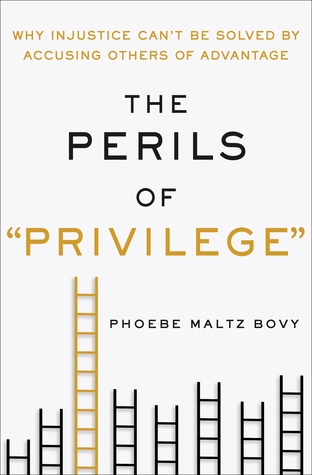I'm not very familiar with the idea of "privilege", so I decided it would be a good idea read up on it, especially since I see notions of it creeping into Singapore culture (the word "Chinese privilege" has been appearing a few times). I am normally wary of importing American social justice methods wholesale, because it seems to have led to a more divided America which makes me question its efficacy and more importantly, because Singapore is not America and we need to adjust for that.
But I am digressing. I spent one day just reading the book and writing out my thoughts on it. Normally, I'd copy the review over, but it's much, much longer than anything I've ever done, so I'll just link to it.
The Perils of Privilege is an introduction and critique of the privilege framework and the phenomenon of calling out the privilege of others (abbreviated as YPIS - Your Privilege is Showing). If I were to pick one quote to summarise the whole book, it would be:
"On this much, the privilege framework is accurate: Society has hierarchies, and some categories of people are - all things equal - luckier than others. Those who deny that "privilege" exists in those broad, sweeping areas where you need your head rather deep in the sand not to have noticed [...] need not so much a privilege check as an introduction to reality.
The trouble is that those hierarchies don't explain all injustice, and that they don't always correspond to the hierarchies that "count" according to the privilege framework."The book uses YPIS to discuss a wide range of things issues from the 2016 American election to cultural appropriation (like the Kimono exhibit from the Boston Museum of Fine Arts). I really liked these quotes from the discussion on the kimono controversy (if you didn't know, a few Asian-Americans were upset when a replica of a kimono worn in a painting by Monet was made for visitors to try on):
"According to news reports, Japanese observers were partly baffled, but also annoyed at having their plight, not so much appropriated, as invented by other East Asians. Can Chinese Americans by offended on behalf of Japanese people who, when consulted, are not actually offended?
Yet a further, ignored, angle is the question of whether it's offensive (or even inaccurate) to suggest that Japanese people are somehow underdogs with respect to white Americans in the twenty-first century.
The appropriation discussion is thus a microcosm of the privilege critique more generally. Despite being ostensibly about social justice, it ends up reinforcing and maybe even inventing hierarchies."To continue summarising the book would make this review far too long (the link above will lead to the full summary), but in short, I think this is something that everyone should read because the concept of "privilege" is something that has left American shores and traveled around the world. The book uses many examples to explain what the privilege framework is and how it can be problematic.
As for me, I think that the privilege framework should stay in academia. It is a valid way of seeing things, but I think this victim hierarchy has a way of diverting attention from the real problem.
Let's call a spade a spade, and not by a different name. I sincerely hope that the fledgling privilege movement in Singapore (which seems to be a wholesale importation of the American framework, but with the names of the privileged change) is discarded for a method that is more accurate and less divisive than the privilege call outs.
Disclaimer: I got a free copy of this book from the publisher via NetGally in exchange for a free and honest review.


Thank you for sharing your perspective on this book. As an American, I can find it interesting to hear/read what others think of what is coming out of the U.S. and how it impacts (or doesn't) them.
ReplyDeleteThis book sounds really interesting--and seems to raise some good points. I only know as much as I've read on the internet and heard in office conversations (and a few off-hand articles). I can see how the idea of privilege could help in academia and even for self-awareness (if a person uses it to better themselves). It's certainly something I've considered. You (and the author) raise good points about current use of the privilege framework and how ineffective it can be in healing and improving the problems at hand and just how much more divisive it can be.
Thank you for giving me something to think about, Eustacia. I appreciated your live posting of your thoughts on this book.
Thank you for the thoughtful comment, Wendy! I hope you get the chance to read this because I'd love to hear your thoughts on it(:
Delete